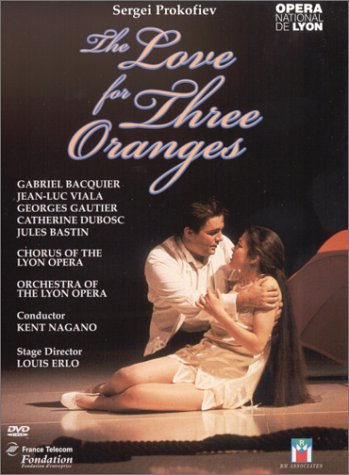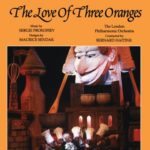Prokofiev – The Love for Three Oranges / Nagano, Opera National de Lyon
With neat, plain building-block designs by Jacques Rapp, Louis Erlo’s energetically-staged production of Prokofiev’s surreal fairy-tale for the Lyon Opera is full of cartoon characters and swift farce. Based on a play by Carlo Gozzi, “L’Amour des Trois Oranges” tells the story of a doleful, hypochondriac Prince, who can only be cured through laughter. When he breaks into hysterics at the expense of the evil witch Fata Morgana, she curses him. His fate is to fall in love with three oranges. Speed and good humor make the stage bristle with life and Erlo’s sunny conception is typified by the Prince, less an effete neurotic as Jean-Luc Viala plays him, than a pure Danny DeVito figure, pear-shaped and peppery. One of Prokofiev’s running jokes is the warring camps of opera-lovers who keep wanting to intervene from beyond the proscenium and Erlo realizes this conceit very effectively, with the Lyon chorus clambering in and out of stage boxes and eventually invading the onstage action. Even the King, the great French bass Gabriel Bacquier, makes his entrance as a bumbling latecomer amid the front stalls. 105 minutes.The ostensible subject of Prokofiev’s surrealistic comedy The Love for Three Oranges is a fairy tale similar to Mozart’s The Magic Flute: a prince on a quest for a beautiful princess with whom he has fallen in love from a distance; villains of horrifying (though comic) nastiness; magic charms and enchantments (for example, the princess is turned into a rat); and a titanic struggle between the forces of good and evil. But in its subtext, it is an opera about opera, beginning with a near-riot. The chorus is divided into two groups–opera patrons in tuxedos demanding a serious drama and stage hands in working clothes who insist on a comedy.
In one dimension, this work is a discussion of operatic styles and conventions, and this is the level on which the Opera de Lyon production triumphs most decisively. Its style is self-consciously brilliant, as it should be. The performers’ acting style is as important as their voices, and they have refined every verbal nuance, every gesture, to perfection, including a lot of pure slapstick. This opera, in this production, will appeal particularly to two types of audience: sophisticates who will relish its subtexts, parodies, insider jokes, and chic staging, and children who will be attracted by the story of a prince (son of the King of Clubs) who angers a witch and suffers a terrible curse: he will fall hopelessly in love with three oranges. –Joe McLellan



![Prokofiev: The Love of Three Oranges [DVD Video]](https://www.orangeplease.com/wp-content/uploads/2018/12/518hC6gniyL-150x150.jpg)
![Prokofiev: The Love for Three Oranges [Blu-ray]](https://www.orangeplease.com/wp-content/uploads/2018/07/512fVExOdYL-150x150.jpg)








